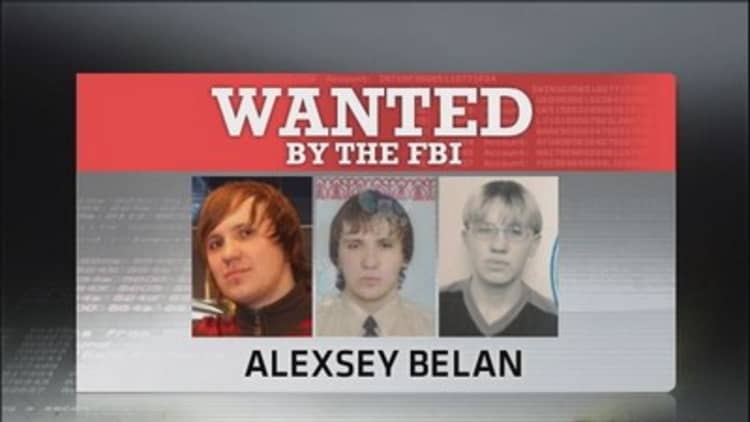
The FBI has put out its new "Cyber's Most Wanted" list, doubling its size with five new names whom the bureau says are responsible for collectively compromising millions of computers.
"The ultimate goal of Cyber's Most Wanted is to help us capture these criminals and bring them to justice," said Emily Odom, a supervisory special agent with the FBI's Cyber Division.
Choosing people for the list, which was updated in November, was a complicated and lengthy process, Odom said. "We began by asking all 56 field offices to provide candidates to be reviewed. We then had special agents review this list and select specific criminals based on different elements to include the sophistication of the crime," she said, "as well as the number of victims affected, as well as the amount of damages caused by the crime."
Historically, the majority of hacker suspects have come from China and Eastern Europe. Three new people on the list hail from countries like El Salvador and Pakistan.
Many come from countries that are less than helpful with the process of bringing suspects to the United States, Odom said.
(Read more: More bitcoins. more problems: Hackers stealing bitcoins)
"There are definitely complications to bringing these people to justice from countries where they may not extradite their own citizens. But we are having success in capturing these individuals as they travel between countries," she said.
Here are the newest names on the "Cyber's Most Wanted" list:
Alexsey Belan of Russia
Belan is alleged to have obtained the user databases of e-commerce companies in Nevada and California and then selling them. "Belan entered into a really sophisticated scheme in which he compromised three different U.S. companies. As part of that compromise, he not only stole millions of identities, he also used some of the credentials of inside employees to further compromise their systems," said Odom.
Farhan Arshad and Noor Aziz Uddin of Pakistan
Arshad and Uddin are wanted for their alleged involvement in a $50 million-plus telecommunications hacking scheme. "It involved them compromising a business telephone system and then generating telephone calls from that system to premium numbers," Odom said.
"This caused the victim companies to incur a large amount of cost due to these telephone calls that they were then billed for," Odom said, "even though they didn't initiate the calls or want the calls to be made."
Carlos Perez-Malera of El Salvador
Perez-Malera is accused of selling software that allowed purchasers to spy on a victim of their choice. The software was sold at least 1,000 times, the FBI says.
People were lured to buy the software on Perez-Malera's website, which said it could catch a cheating lover. Those who took the bait got a program that was called Lover Spy.
Victims of the software received what seemed to be an online greeting card. Actually, the card contained software that allowed users' personal communication to be captured. One version of the software even allowed the purchaser to spy on the victim by turning on their webcam.
(Read more: New woes for Obamacare website—hackers)
Perez-Malera made thousands of dollars from selling the software, but did not benefit from the personal information, the FBI says. The FBI's Odom said Perez-Malera was added to the list because of the sophistication of his alleged crime. "It really went into the private lives of all these individuals and took all their communications and made that readily available," she said.
Andrey Nabilevich Taame of Russia
Taame is alleged to have been involved in Operation Ghost Click, which compromised more than 4 million computers worldwide, including 500,000 in U.S. agencies such as NASA.
Along with his six alleged co-conspirators, Taame made money from the amount of traffic directed to websites where they were paid to advertise, the FBI said. To increase traffic—and their revenue—the alleged hackers directed the infected computers to the sites.
(Read more: JPMorgan warns card users after cyberattack)
Operation Ghost Click made $14 million. Taame is the only alleged member who is at large.
The FBI is offering rewards for information that leads to the capture of any of the names on its new list. If you have any information, the FBI asks you to contact your local FBI office or the nearest American embassy or consulate.
—By CNBC's Jennifer Schlesinger. Follow her on Twitter @jennyanne211.





